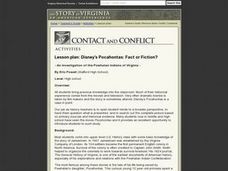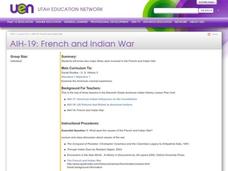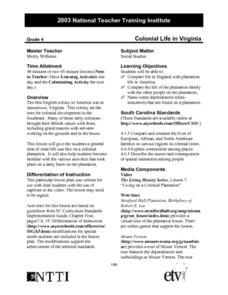Curated OER
Disney's Pocahontas: Fact or Fiction?
Did you know that Pocahontas was 12 when Jamestown was established? Did you know that she later married John Rolfe? Did you know that she lived in London for two years? Did you know that she died of small pox? Class members study the...
Curated OER
The Industrial Age in America: Robber Barons and Captains of Industry
Middle schoolers define terms "robber baron" and "captain of industry," list positive and negative actions of one or more captains of industry/robber barons, and take and support stand as to whether particular financier/industrialist is...
Curated OER
Uniform Design
Learners investigate the military by examining their uniforms. In this design lesson, students analyze the military uniforms from different locations and time periods. Learners create new ideas for current military uniforms.
Curated OER
Truman and MacArthur
Young scholars discuss and fill out a chart on how President Truman fired General MacArthur. In this Truman and MacArthur lesson plan, students study telegrams, letters, and other documents, and fill in a chart about supporting or not...
Curated OER
Fur Trade Economics
Learners demonstrate understanding of what the fur trade was and how it was operated, including the bartering process, by participating in a mock trade activity and assessing the value of items based on their needs and wants.
Curated OER
Clay Whistle/Ocarinas
Seventh graders create a clay whistle/ocarina and sculptue in the round using the pinch technique.
Curated OER
Freedom to Worship
Fifth graders read the biographies of seven colonists and determine their position on the freedom of religion. They conduct a panel discussion of seven personalities and debate the religious freedom in America.
Curated OER
Coming to America
Fifth graders listen to the song America by Neil Diamond, view pictures of Ellis Island, and role play as processing officers who evaluate, classify and recommend which immigrants can stay in America.
Curated OER
French and Indian War
Eleventh graders examine why major tribes were involved in the French and Indian War. They write a short paragraph about the causes and answer an essay question based on text and Internet research, citing sources. They research text...
Curated OER
Pleistocene Mammals
Students research the causes of the extinction of Pleistocene mammals. In this Pleistocene mammals lesson, students read essays to understand the Pleistocene epoch. Students write an essay about the personal impact of this epoch.
Curated OER
A Nation Divided: Why Couldn't They Just Get Along?
Fourth graders examine both perspectives of the Civil War as related to the differing economies. In this nation divided lesson, 4th graders view primary sources, examine paper money and a political chart, and review recruitment posters.
Council for Economic Education
Trade in Colonial America / NAFTA
Learners learn the how trade impacted the colonial economy. They analyze the the benefits of NAFTA and learn the advantages to both the United States and Mexico.
Curated OER
The Last Day of Slavery
Young scholars complete pre reading, writing, during reading, and interdisciplinary activities for the book The Last Day of Slavery. In this reading lesson plan, students complete journal entries, go over vocabulary, answer short answer...
Curated OER
Discover a Pond Food Web
Students study the biodiversity of animal life in a pond. They investigate the interdependence between pond organisms by completing a pond dipping activity and completing a checklist.
Curated OER
Postcards From Mars
Fifth graders research and explore what life would be like for human colonists on Mars. They explore various websites, read and discuss newspaper articles, develop a chart of the hardships and conditions that would be faced by colonists...
Curated OER
Compass Rose
Second graders practice identifying the four cardinal directions. After locating a compass rose on a map, 2nd graders explain each point that corresponds to a direction. Using a toy ship as a manipulative on a map, students observe its...
Curated OER
Oklahoma Stone Soup
Class members complete activities related to the story "Oklahoma Stone Soup." First, pupils read, discuss, and answer questions about the story. Next, to incorporate math into the lesson, learners make stone soup using a variety of...
Curated OER
Columbus wants to find a shorter route to Asia
Eighth graders identify the reasons why Columbus wanted to find a shorter route to Asia. They make a timeline of the sequence of events surrounding his explorations. Students draw a map of the routes taken by early explorers around...
Curated OER
Colonial Life in Virginia
Fourth graders compare and contrast life in England with plantation life in America. They study the dependencies or mini-industries that could be found on plantations.
Curated OER
Expedition Stories
Students use the Internet to research and discover information about expeditions that were formed to observe the transit of Venus. In groups, they work together to present information about the expeditions and create a visual aid.
Curated OER
1856-1865: Abolitionists and the Civil War
Students explore the concept of philanthropy. In this abolition lesson, students watch "Uncle Tom's Cabin" and discuss the philanthropic acts they witnessed in the film. Students also complete an activity that requires them to determine...
Curated OER
G'Day Mate
Students understand that Australia is the smallest continent, locate it on a map and sing about the continents. In this Australia lesson, students listen to facts about Australia and complete a book about information they have learned.
Curated OER
The Middle Passage
Eighth graders locate the Middle passage and describe the experiences of slaves in the Middle Passage. In this Middle Passage lesson, 8th graders describe life as a slave during the Middle Passage. Students write as if they were a...
Smithsonian Institution
POWs
Why did Vietnam POWs and their families receive more media attention than POWs in previous wars? To answer this question, class members view artifacts, read articles, and engage in class discussion. Individuals then assume the voice of...

























